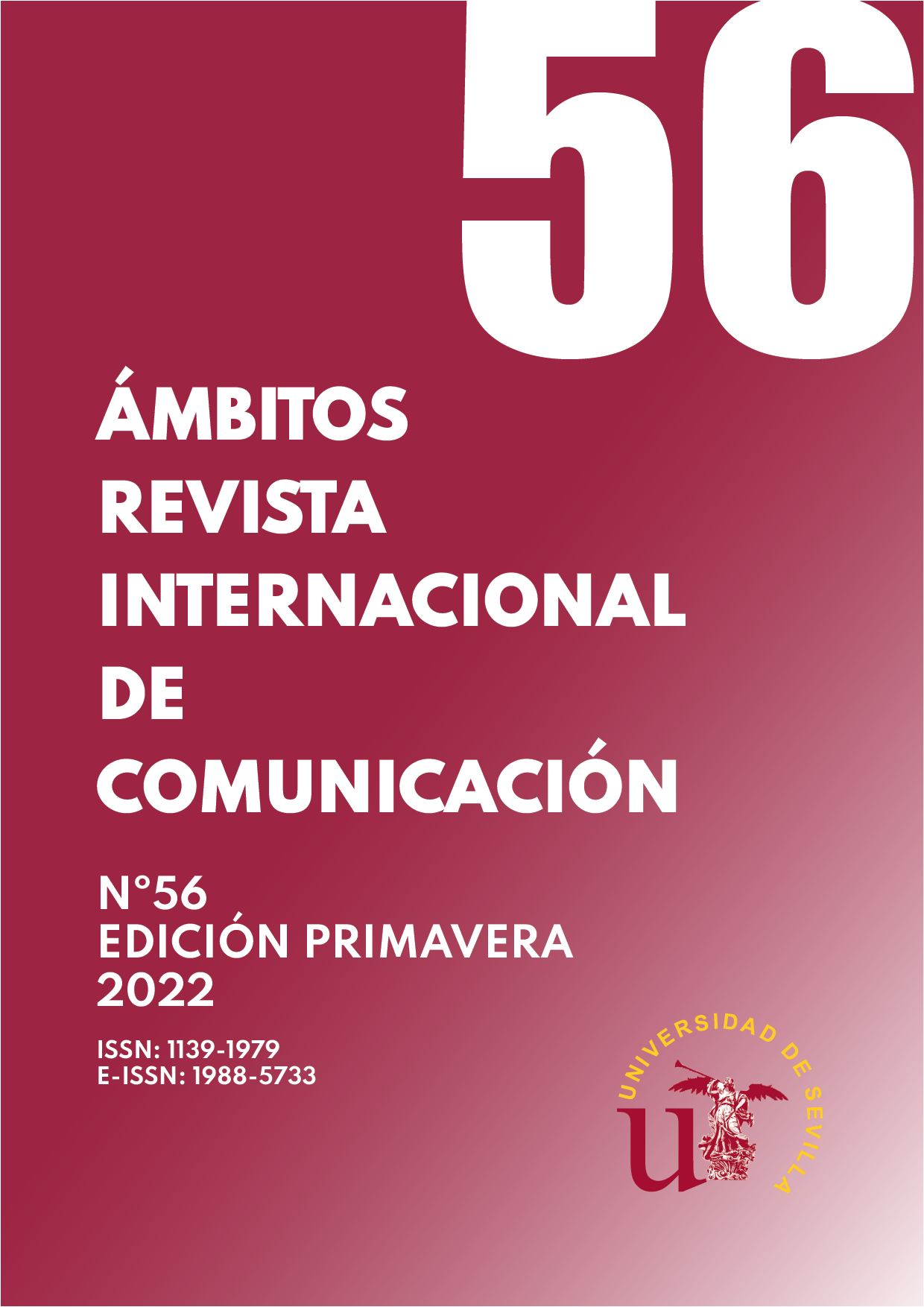Digital Ethnography of Political-Social Cyberactivism. Case: 2019 Spanish General Elections
DOI:
https://doi.org/10.12795/Ambitos.2022.i56.02Keywords:
cyberpolitics, elections, social-network, virtual-ethnographyAbstract
The article analyzes the inclusion of digital anthropology and ethnography in the study of the audience online that conditions cyber politics with the use of social networks on the Internet. For some years now, the political cyber activism of users, carried out through social media, has played an important role in strengthening or supporting movements, parties and political leaders, directly influencing the results of the various electoral elections in different parts of the world. In order to understand this phenomenon, it is important to take into account the aforementioned disciplines, which constitute paradigms in the emergence of new political movements in the network and which, when applied to social networks, make up an increasingly necessary study cocktail. For the present work, a bibliographic review of the description and fundamental characteristics of digital anthropology and ethnography is carried out and the web pages of the main social media (Facebook, Twitter and Instagram) of political parties and leaders in the general elections have been taken in Spain, on 2019. The result obtained suggests an increasingly specialized use of ethnographic and anthropological techniques in the study of social networks in political or social spheres, and, consequently, their use in the study of media audiences on the Internet.
Downloads
References
Angrosino, M. (2012). Etnografía y observación participante en investigación cualita-tiva. Ediciones Morata.
Augé, M. (2007). Por una antropología de la movilidad. Gedisa
Belli, S.; López, C.; Romano, J (2009). El mutante en la biblioteca de Alejandría: de la tinta al silicio, cuatro movimientos para una página que se vuelve pantalla. Trasatlántica de Educación, Vol. VII. pp. 44-56.
Brown, M.F (2010). Relativismo cultural 2.0. En Cruces, F. y Pérez, B. (Comp.), Tex-tos de Antropología Contemporánea (pp. 25-57). Universidad Nacional de Educación a Distancia.
Coleman, G. (2010). Ethnographic approaches to digital media. Annual Review of Anthropology, 39, 487-505. Fecha de consulta: 20 de septiembre de 2017. http://www.annualreviews.org/doi/abs/10.1146/annurev.anthro.012809.104945?journalCode=anthro.
Contreras, P. (2004). Me llamo Kohfam. Identidad hacker: una aproximación antropo-lógica. Gedisa.
Escobar, A. (2005). (Trad. Carlos Barragán). Bienvenidos a Cyberia. Notas para una antropología de la cibercultura. Revista de Estudios Sociales nº 22, 15-35. Colombia, Universidad de los Andes.
Estalella, A., & Ardèvol, E. (2007). Ética de campo: hacia una ética situada para la investigación etnográfica de internet. Forum Qualitative Social Research, pp. 3-8.
Etchevers, N. (2010). Ruta etnográfica para la comprensión de la comunicación on-line. Fecha de consulta: 22 nov 2016. http://ddd.uab.cat/pub/dim/16993748n1/16993748n1a2.pdf
Flichy, P. (2001). Lo imaginario de Internet. Tecnos Grupo Anaya.
Giddens, A. & Sutton, P. (2014). Sociología-7ª Ed.. Alianza Editorial.
Harris, M. (2014). Antropología cultural. Alianza Editorial.
Hine, C. (2004). Etnografía virtual. Editorial UOC.
Horst, H. A. & Miller, D. (2012). Digital Anthropology. Bloomsbury.
Mc Caughey, M. (2014). (Ed.). Ciberactivism on the participatory web. Routledge, Taylor & Francis.
Nadruz, J.A. (2010). Las comunidades virtuales Xbox: interacción y socialización en el ciberespacio. Fecha de consulta: 22 nov 2014. http://www.unesco.org.uy/shs/fileadmin/templates/shs/archivos/anuario2009/Nadruz.pdf
Pink, S. & Horst, H. (2016) Digital Ethnography. Sage Publications Ltd.
Sören, A. (2014). Etnografía Virtual en redes sociales: el caso de Facebook. iS+D Fundación I+S Avanzada. Fecha de consulta: 20 enero 2015. http://blog.isdfundacion.org/2014/12/01/etnografia-virtual-no-2-etnografia-virtual-en-redes-sociales-el-caso-de-facebook-hei-man-2008/
Vázquez, A. (2008). Ciberantropología. Cultura 2.0. UOC editorial.
Downloads
Published
How to Cite
Issue
Section
License
Copyright (c) 2022 Jesús Miguel Flores-Vivar, Ana María Zaharía

This work is licensed under a Creative Commons Attribution-NonCommercial-ShareAlike 4.0 International License.
Ámbitos. Revista Internacional de Comunicación is an open access journal, which means that all content is freely available at no charge to the user or their institution. Users may read, download, copy, distribute, distribute, print, search or link to the full text of articles, or use them for any other lawful purpose, without seeking prior permission from the publisher or author. This definition of open access is in accordance with the Budapest Open Access Initiative (BOAI).

Unless otherwise noted, all content in the electronic edition is distributed under a "Creative Commons Attribution-NonCommercial-ShareAlike 4.0 International License". You can consult the informative version and legal text of the licence here. This should be expressly stated in this way where necessary.
In case of acceptance of the manuscript, the authors cede the rights of the work for its publication to Ámbitos. Revista Internacional de Comunicación under the Attribution-NonCommercial-ShareAlike 4.0 International license contract (CC BY-NC-SA 4.0). The authors retain copyright and third parties are authorised to copy, distribute and make use of the work, provided they comply with the terms and conditions set out in the licence
- Cite the authorship and the original source of publication (journal, publisher and URL of the work).
- Do not use them for commercial purposes.
- If you remix, transform or create from the material, you must release your contributions under the same license as the original.
More information can be found at https://creativecommons.org/licenses/by-nc-sa/4.0/deed.es


















